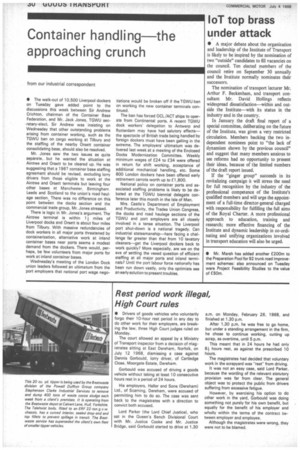Rest period work illegal, High Court rules
Page 32

If you've noticed an error in this article please click here to report it so we can fix it.
• Drivers of goods vehicles who voluntarily forgo their 10-hour rest period in any day to do other work for their employers, are breaking the law, three High Court judges ruled on Monday.
The court allowed an appeal by a Ministry of Transport inspector from a decision of Magistrates sitting at East Dereham, Norfolk, on July 12 1968, dismissing a case against Dennis Gorbould, lorry driver, of Cartledge Close, Moorgate Estate, Dereham.
Gorbould was accused of driving a goods vehicle without taking at least 10 consecutive hours rest in a period of 24 hours.
His employers, Haller and Sons (Dereham) Ltd., of Scarning, Dereham, were accused of permitting him to do so. The case was sent back to the magistrates with a direction to convict both accused.
Lord Parker {the Lord Chief Justice), who sat in the Queen's Bench Divisional Court with Mr. Justice Cooke and Mr. Justice Bridge, said Gorbould started to drive at 1.30 a.m. on Monday, February 26, 1968, and finished at 1.30 p.m.
After 1.30 p.m. he was free to go home, but under a standing arrangement in the firm, he chose to continue working, cutting up scrap, as overtime, until 5 p.m.
This meant that in 24 hours he had only hours rest, as against the prescribed 10 hours.
The magistrates had decided that voluntary work in the scrapyard was "rest" from driving.
It was not an easy case, said Lord Parker, because the wording of the relevant statutory provision was far from clear. The general object was to protect the public from drivers suffering from excessive fatigue.
However, by exercising his option to do other work in the yard. Gorbould was doing something not purely for his own benefit, but equally for the benefit of his employer and wholly within the terms of the contract between employer and employee.
Although the magistrates were wrong, they were not to be blamed.




























































































































































